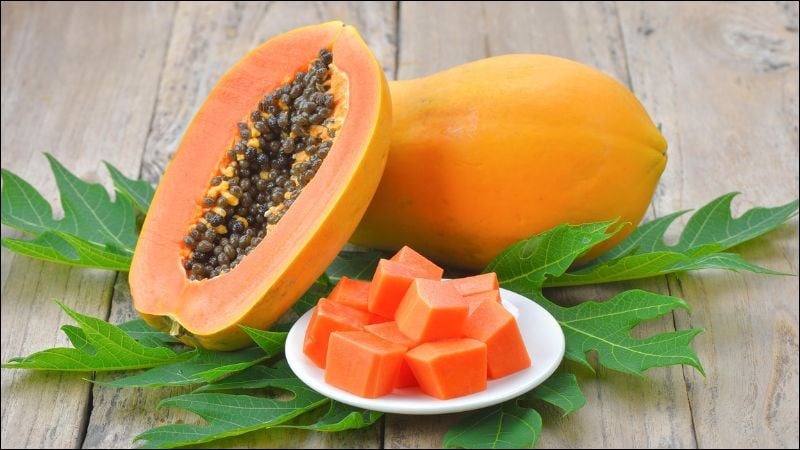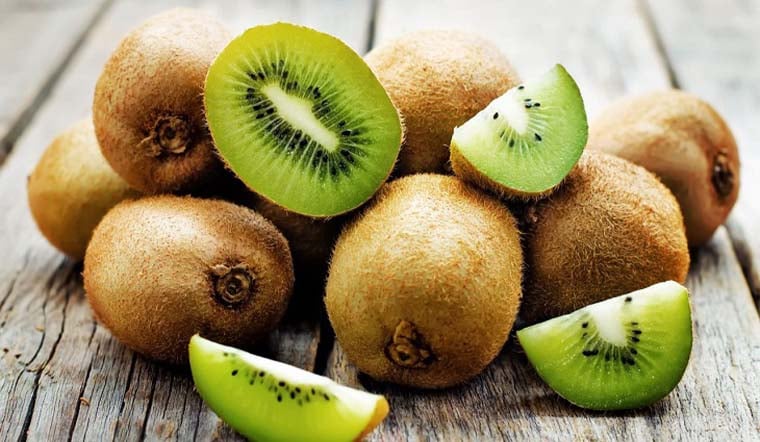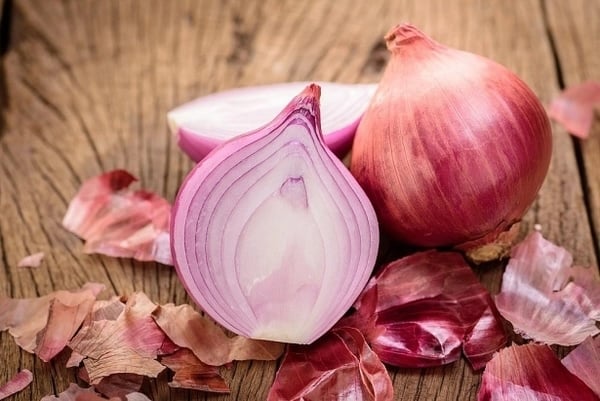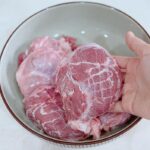Watermelon
Watermelon is a ground-grown fruit with a thick, sturdy rind that protects the fruit from pests and sprays. Composed mostly of water, watermelon is an ideal choice during hot summer days, providing a refreshing and cooling sensation.
Mango
Mango is a fruit renowned for its low pesticide residue. The thick skin of a mango not only protects the flesh inside but also makes it safer for consumption. However, to ensure hygiene, it is advisable to wash the mango thoroughly before peeling.
Papaya
Papaya is a very familiar fruit in Vietnam. With its thick skin, papaya has a natural protective barrier that helps shield against pesticide residue. According to a study, approximately 80% of papayas show no signs of harmful toxins due to the protective layer that the thick skin provides.
Moreover, papaya is a valuable source of dietary fiber, vitamin A, vitamin C, and folate, offering wonderful health benefits such as supporting weight loss and promoting healthy skin. You can enjoy papaya by consuming it directly, blending it into a smoothie, or incorporating it into delicious and nutritious desserts.

Papaya is a Familiar Fruit in Vietnam
Pineapple
According to a survey of 360 pineapples, up to 90% of them showed no pesticide residue. Pineapple boasts a thick skin that safeguards the inner flesh from external factors. Pineapple is not only a rich source of vitamin C but also manganese, which aids digestion and boosts immunity.
The Environmental Working Group (EWG) warns that the use of pesticides in pineapple-growing regions can contaminate water sources, harm aquatic life, and pose potential risks to nearby communities.
Therefore, experts recommend that consumers opt for organic pineapples and promote more sustainable farming methods that are environmentally friendly.
Avocado
According to the “Clean Fifteen” list published by the Environmental Working Group (EWG) in the United States, avocado is one of the safest products, with only 1% of avocado samples found to have pesticide residue. The thick and sturdy skin of an avocado effectively protects the soft flesh inside.
Not only is avocado delicious, but it is also packed with monounsaturated fats, fiber, vitamin K, and folate, making it extremely beneficial for cardiovascular health. Avocado is a perfect choice for those aiming to maintain a weight loss regimen and improve their skin health.
Kiwi
Recent analyses indicate that approximately 65% of tested kiwi samples were free from pesticide residue. Kiwi is a fruit that is highly rich in fiber and essential nutrients. Typically, the skin of a kiwi is often discarded, but in reality, it is entirely edible.
A 76-gram kiwi can provide up to 177% of the body’s daily vitamin C needs, offering potent antioxidant effects and boosting immunity.

A 76-gram Kiwi Provides Abundant Vitamin C
Corn
While corn requires a significant amount of fertilizer to grow, fortunately, the amount of pesticide residue or growth stimulants in corn kernels is very low. When purchasing corn, look for fresh, plump cobs with intact husks. The fresher the corn, the better it retains its sweetness and crispness when boiled.
Asparagus
Asparagus is rarely affected by pests or insects, hence, the growing and harvesting process requires minimal use of pesticides.
Onion
Onions are seldom threatened by pests, so they rarely require spraying with pesticides. When selecting onions, look for firm, juicy bulbs that will last longer in the refrigerator.

Onions Are Rarely Sprayed with Pesticides
Eggplant
With its thick and sturdy skin, eggplant is less susceptible to pesticide contamination. Eggplants come in various sizes, so you can choose according to your family’s needs.
Cabbage
The compact leaves of cabbage might lead some to believe that it contains high levels of pesticide residue. However, in reality, cabbage is easy to grow and rarely affected by pests, so the use of pesticides is not common. Cabbage is considered safe for daily consumption and is even regarded as a “superfood” due to its numerous health benefits.
Snap Peas
Snap peas are among the vegetables with the lowest pesticide residue. They are not only nutritious but also easy to prepare, making them ideal for everyday family meals.



































